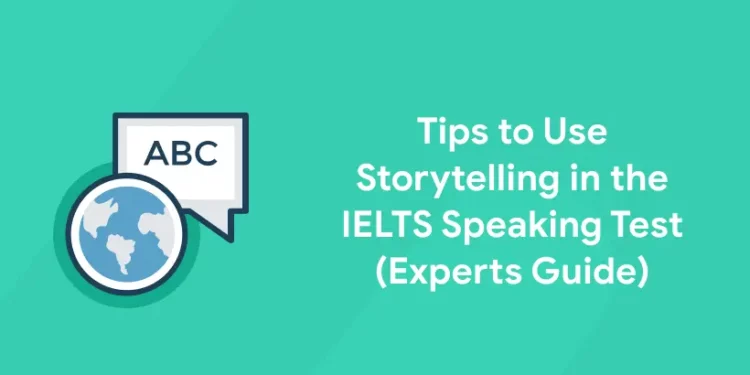Table of Contents
The International English Language Testing System is a popular exam around the world. IELTS is a short form for this. Any person’s proficiency with the English language can be evaluated with this test. This exam is significant because it provides millions of professionals and students with the opportunity to pursue their ideal occupations or educational programmes in English-speaking nations. There are four parts to the IELTS exam. The IELTS speaking test is one of the exam’s four primary components.
Storytelling in the IELTS Speaking Test
The IELTS speaking test is an important part of the IELTS exam since it measures a candidate’s ability to communicate effectively in English. Candidates need to impress the examiner with their language abilities and hold their attention in order to do well in the speaking test. Using stories to accomplish this is one efficient method. The test-taker listens to the question, provides a brief, concise response, and then moves on. The strategy is sound, yet it seems like a conventional and flat method of preparing for the IELTS speaking test. In order to earn extra points in the speaking segment, test takers aiming for a high IELTS score need to think creatively.
Crack IELTS Exam With Online Coaching – Join Now
Best IELTS Speaking test Tips
You need to keep a few things in mind if you want to prepare well and perform at your best. These suggestions are made by experts. Continue reading to ace the IELTS exam.
Develop Good Pronunciation and Intonation
For the IELTS speaking exam, intonation and pronunciation are essential. Here’s how to put them to use:
Pronunciation: Practise all of the sounds, particularly the ones that are challenging for non-native speakers. You have the option to record yourself and hear how you sound in comparison to native speakers. Make use of internet resources or language apps that provide you with audio feedback to enhance your pronunciation. One of the most crucial speaking advices for the IELTS is this one.
Intonation: Intonation refers to how your voice rises and falls when speaking. It conveys your feelings and the meaning of it. Keep an eye out for the many contexts in which native speakers employ their voice tonality. When you speak, maintain consistent intonation patterns. Listening to English speakers in a variety of contexts, such as discussions, interviews, and narratives, can help you improve your understanding of intonation.
Practice Regularly
The key to doing well on the Speaking portion of the IELTS is consistent practice. Here are some strategies to make regular practice a part of your schedule:
Language Partners: Find a language exchange partner or join a discussion club to regularly practise speaking English. Honest talks enable you to put what you’ve learnt into practice and boost your self-esteem.
Online Resources: Many internet platforms and apps are aimed towards English language learners. They include speaking practice chances, activities, and tests. Some even offer practice exams that mimic the IELTS Speaking exam. If you’re wondering how to be ready for IELTS speaking without any formal training, the finest tools are available online. A few of them are really beneficial and free.
Record Yourself: Take notes on your spoken responses to a range of subjects. Take a close listen to your recordings and note any mistakes you made in terms of pronunciation, grammar, and fluency.
Expand Your Vocabulary
This IELTS speaking tip can assist you in increasing the size of your vocabulary. It’s a slow process that requires active participation.
Reading Widely: Read English-language scholarly publications, books, newspapers, and magazines. You are exposed to a variety of terminology in a variety of circumstances through this. To keep adding words to your vocabulary, push yourself with materials that are just a little bit above your current proficiency.
Contextual Learning: Learn how words are utilised in sentences rather than only memorising their meanings. Take note of idiomatic idioms and collocations, which are words that frequently go together. The contextual learning improves the effectiveness of language retention.
Flashcards and Vocabulary Journals: Flashcards can be useful if you’re wondering how to speak more effectively on the IELTS. Make flashcards with the definitions of new words on them. Go over these frequently. You may make new terms simpler to remember and use in conversation by keeping a vocabulary diary where you can record them together with sample sentences, explanations, and associations.
Work on Your Fluency
Speaking without unnecessary pauses and with ease and coherence is what is meant by fluency. These IELTS speaking strategies will help you speak more fluently:
Shadowing: Repeat what native speakers say when you listen to their audio recordings. You can practise matching the pace and flow of natural speech with this activity.
Conversation Practice: Have impromptu discussions with your language partners. Make an effort to keep the conversation flowing naturally without interfering.
Use Connectors: Learn and apply transitional phrases and connectors to connect your ideas seamlessly. Words such as “Moreover,” “Furthermore,” and “In addition” can facilitate a smooth transition between ideas.
Crack IELTS Exam With Online Coaching – Join Now
Don’t Memorize Responses
Memorising answers can hurt you in the IELTS speaking exam because the examiners are trained to recognise prepared responses. Rather:
Understand the Structure: Learn about the typical question formats and the expected format for answers. This will make the test go more smoothly for you.
Practice Authentic Conversations: Have open discussions and get comfortable answering questions in an organic way. This strategy makes sure that your answers are sincere and impromptu.
Be Concise and Relevant
You must stay on topic and use good time management in Part 2 of the IELTS Speaking test:
Plan Your Response: Make an outline of your response during the allotted minute of preparation. With an introduction, three main ideas, and a conclusion, create a clear structure.
Stay on Topic: It is normal to give some background information, but try not to deviate from the topic. Pay close attention to the subject and demonstrate your extended speaking skills.
Fillers Should Be Used Carefully
Remove words like “um” and “uh” to boost your IELTS speaking skills. These words have the potential to make you sound less confident and polished. Here’s how to utilise them more effectively.
Practice Pausing: Try taking brief pauses to gather your thoughts rather than fillers. These pauses might lend you an air of composure and reflection.
Being Aware of Your Surroundings: Be mindful of any gaps. You can identify patterns in your practice sessions and take steps to reduce their frequency by recording them.
Pay Attention to Grammar
The IELTS speaking exam heavily relies on your ability to express ideas clearly. Here’s how to get more proficient in grammar:
Grammar Exercises: Practise grammar using the exercises found in English textbooks or online. Please be aware of frequent grammatical errors and learn how to fix them.
Sentence Structure: Develop your ability to form intricate sentences. This illustrates your versatility in sentence construction, which is crucial for the Part 3 conversations.
Use a Range of Vocabulary and Expressions
Your ability to use a variety of languages demonstrates your competency on the IELTS speaking exam. in order to use a range of terms and expressions
Thesauruses: Make advantage of thesauruses to find synonyms for frequently used terms. Try using other synonyms to prevent repetition.
Idioms and Phrasal Verbs: Acquire knowledge of phrasal verbs and idiomatic phrases. When used properly, these can improve the quality of your speech and show off your fluency.
Contextual Usage: Take note of the context in which specific words and expressions are employed. This clarifies for you when and when to employ them efficiently.
Stay Calm and Confident
To do your best on test day, you must learn to control your nerves. One of the best speaking strategies for the IELTS is this:
Visualization: Imagine yourself walking confidently into the examination room, speaking clearly, and interacting with the examiner in a productive way. This mental warm-up can help you feel more confident.
Deep Breathing: To reduce your anxiety both before and during the test, practise breathing techniques. Taking deep breaths can aid with attention and anxiety reduction.
Positive Self-Talk: Positive affirmations should take the place of negative ones. Remind yourself of your skills and readiness.
Crack IELTS Exam With Online Coaching – Join Now
IELTS Speaking Test Format
It is essential to understand the Speaking test structure in order to prepare appropriately. There are three components to the test, and each one has a specific function. You can more successfully adjust your responses to each section of the IELTS speaking exam if you are aware of these differences.
Part 1: Introduction and Interview
In this section of the IELTS speaking test, the examiner will make an effort to put you at ease while assessing your ability to carry out simple conversation. The inquiries usually include commonplace topics such as your residence, place of employment, school, interests, and pastimes. Make sure your response is concise, informative, and easy to understand.
Part 2: Long Turn
You have one to two minutes to discuss a topic in this section. You have one minute to write a response to a question on a task card. It’s your responsibility to talk clearly and constantly during this period. During the one-minute preparation period, brainstorm, develop a clear structure, and jot down crucial topics.
Part 3: Discussion
Part 3 expands on the topics covered in Part 2 with further details. It will be on the subject you covered in Part 2, with more detailed questions about challenging and abstract concepts. This section assesses your ability to engage in more in-depth discussion and provide thoughtful answers to questions.
IELTS Coaching- Online Course
Entri Learning App is one of the best online learning platforms available out there for preparation. With well-versed faculty, well-structured study material, high-quality video content, doubt clarification sessions, personalized study plans, and motivating teachers, you will get a high score in each section here.
Course Overview
Entri’s IELTS preparation courses have been structured to concentrate your time and energy on designing the skills and techniques you require to accomplish your IELTS goals. Entri offer:
- IELTS Writing (Academic)
- IELTS Writing (General)
- IELTS Speaking (both Academic and General)
- IELTS Reading (both Academic and General)
- IELTS Listening (both Academic and General)
- IELTS Reading and Listening Combined (Academic and General Tests)
IELTS is the world’s most widespread English language test for those desiring to study in higher education in an English-speaking country. This IELTS course offered by the Entri Learning App will train you to take the IELTS Academic tests in a good manner.
FAQs
Q1. Can I make up stories for the IELTS speaking test?
Ans: Although it’s not strictly prohibited, making up stories doesn’t improve your score.
Q2. In the IELTS, how do you tell a story?
Ans: Select an engaging and pertinent subject, organise the narrative, employ vivid language and evocative details, utilise proper grammar and terminology, practice, and get feedback.
Q3. What are the best strategies for IELTS speaking?
Ans: Try to communicate oneself using a sophisticated vocabulary. Avoid repeating words and phrases within a sentence. Pay attention to the grammar in the inquiry.
| Related Articles | |
| How to Join in IELTS Course | How to learn IELTS at Home |
| IELTS Cue cards and Examples | How to Prepare for IELTS in 2 Month |










